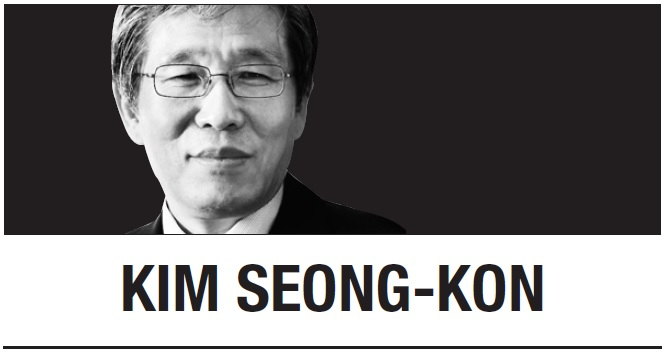
The 1991 American science fiction film, “Terminator 2: Judgment Day,” teaches us one valuable lesson: “Appearances are deceiving.” In the movie, a man in a police uniform is, in fact, a T-1000 advanced cyborg that is a ruthless killing machine.
Conversely, the man dressed like a motorcycle gangster, played by Arnold Schwarzenegger, is a good cyborg whose mission is to protect John Connor, the future leader of the human resistance against the Artificial Intelligence that tries to annihilate human civilization.
Due to their outfits, however, people are confused and liable to mistake their identities.
Moreover, in the 1984 prequel, “The Terminator,” the model 101 cyborg, played by Schwarzenegger, was an evil humanoid replica who tried to kill Sarah, mother of John Connor. Thus, viewers of “Terminator 2” might naturally assume that the 101 model in the sequel is malicious. In that sense, “Terminator 2” opens our eyes to the complex reality that there are many wolves in sheep's clothing and vice versa in our society.
Another lesson we can learn from “Terminator 2: Judgment Day” is that good cyborgs can be better than humans. Indeed, unlike human beings, machines never betray or neglect their duty. It never becomes whimsical or unreliable, either. Watching the Model 101 take care of her son, Sarah realizes that the machine is a perfect father, whereas the boy’s human father is a sheer disappointment.
Furthermore, when and if a humanoid with “deep learning” capabilities develops emotions, the difference between man and machine becomes blurry and a cyborg can even excel humans. Indeed, at the end of “Terminator 2: Judgment Day,” the Model 101 cyborg proves it by sacrificing his life in order to save human civilization.
By contrast, the 2015 film “Terminator: Genisys” is a powerful, eye-opening movie because it warns us of the danger of AI becoming wayward and unruly. It depicts the grim future of a world controlled and governed by the artificial intelligence called Skynet. Initially, scientists created Skynet for peaceful purposes. Gradually, however, Skynet begins thinking on its own and considers humans to be harmful enemies that it must eliminate.
In “Terminator: Genisys,” Skynet takes over the world in 2017 through the program called Genisys, a global operating system through which all the people on Earth are connected. To stop the threat, the protagonists of the film have to go back in time to 2017 to prevent Genisys from ever going online. The movie shows us the familiar scene of people eagerly looking into their smartphones everywhere, not knowing that some invisible force may be controlling and manipulating them. Watching the scene, we realize that we all are connected online through social media these days.
“Terminator: Genisys” also teaches us that a man could have two contradictory identities and we should carefully discern them. In the movie, for example, two identical looking T-800/Model 101 Terminators, one sent by Skynet to 1984 to kill Sarah and the other sent to 1973 to protect Sarah by an unknown party, are fighting each other. Appropriately, Schwarzenegger plays the two ostensibly identical, but radically different Model 101 Terminators, one young and the other old. Perhaps it could be a metaphor for the generation war between the old and the young. It could also symbolize the self-contradictory lives of our politicians who preach socialism for political gain while brazenly savoring the benefits of capitalism.
Another lesson we can learn from “Terminator: Genisys” is that we should be very careful about trusting our political leaders, no matter how trustworthy and reliable they may appear. In 2029, John Connor, the leader of the human resistance, launches a final offensive against Skynet. At that very moment, Skynet attacks him and turns him into an advanced cyborg.
People call John “the last hope of humanity.” Now John has become an agent for Skynet and does not even hesitate to kill his own parents in order to protect the evil AI system. By presenting this appalling situation, “Terminator Genisys” reminds us that our political leaders also can be the agents of the very tyrannical machine they have been fighting or that they may come to resemble the machine they once detested. Watching the movie, we come to realize that the same idea may apply to our politicians who fought against tyranny in the past, only to now ironically resemble the dictators they once hated.
“Terminator Genisys” presents an unnerving reality in which we do not know who to trust. Indeed, we are now living in a complex world where nothing is certain and appearances are deceiving. The liquid, shape-shifting T-1000 cyborg played superbly by Lee Byung-hun is a good metaphor for it.
Yet, we are still mindlessly indulging in smartphones, connected by various social media platforms, often believing fake news as truth, not realizing that someone, human or AI, is controlling and manipulating us from behind. “Terminator Genisys” warns us to awaken and be alert.
Kim Seong-kon
Kim Seong-kon is a professor emeritus of English at Seoul National University and a visiting scholar at Dartmouth College. The views expressed here are his own. -- Ed.







![[Today’s K-pop] Blackpink’s Jennie, Lisa invited to Coachella as solo acts](http://res.heraldm.com/phpwas/restmb_idxmake.php?idx=644&simg=/content/image/2024/11/21/20241121050099_0.jpg)